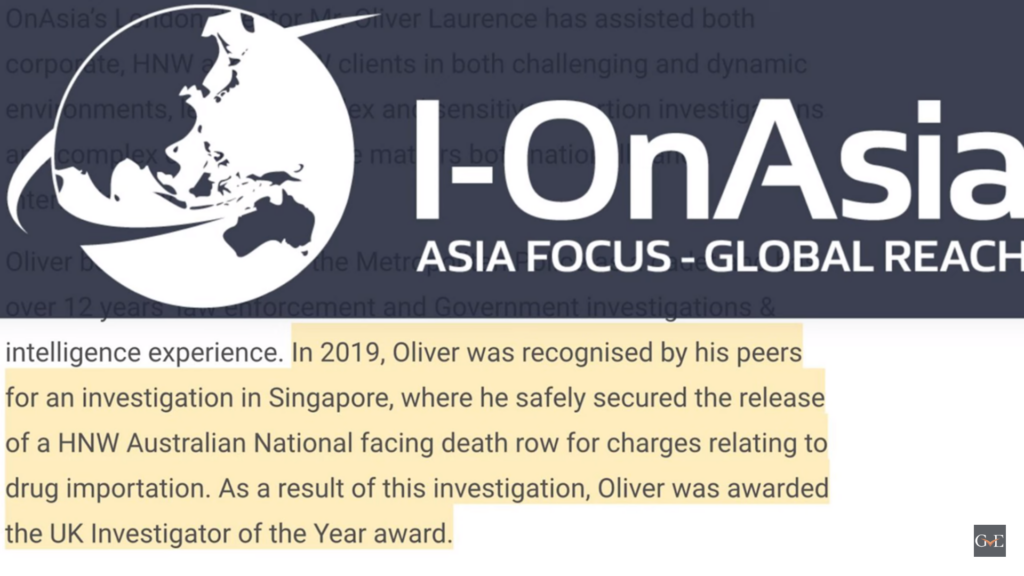- Showroom Case Studies
Recovering Stolen Supercars and Dealing with Blackmailers
Discover how private investigators tackle high-stakes scenarios, insights into surveillance detection while Recovering Stolen Supercars.
In the thrilling landscape of private investigations, few individuals command as much respect and intrigue as Oliver Lawrence. Renowned for his expertise in navigating the shadows, Lawrence has earned accolades as an award-winning private investigator. In a recent podcast episode, Lawrence offers listeners a tantalizing glimpse into his world, where the stakes are high, and the challenges are relentless.
The episode kicks off with an overview of Lawrence’s illustrious career, highlighting the diverse array of scenarios he routinely encounters. From cases of extortion that threaten the fabric of trust to harrowing tales of kidnapping that grip the heart, Lawrence’s portfolio is as varied as it is compelling. Yet, it is perhaps his exploits in recovering stolen supercars that truly capture the imagination, offering a glimpse into a world where luxury and larceny collide.

Recognizing Surveillance and Being Followed
One of the most riveting aspects of Lawrence’s discussion centers on the art of recognizing surveillance—a skill honed through years of experience and meticulous observation. As Lawrence elucidates, the ability to discern if one is being followed can mean the difference between safety and peril. Drawing on his wealth of knowledge, Lawrence delves into the intricacies of counter-surveillance techniques, offering listeners invaluable tips on how to navigate the treacherous waters of surveillance detection.
Central to Lawrence’s approach is the concept of pattern recognition—an innate ability to identify anomalies in one’s surroundings. Whether it’s the subtle recurrence of specific vehicles or the persistent presence of unfamiliar individuals, Lawrence emphasizes the importance of remaining vigilant and attuned to the nuances of one’s environment.

Moreover, Lawrence underscores the significance of time as a critical factor in surveillance detection. By observing the consistent presence of certain elements over an extended period, individuals can glean valuable insights into the nature and scope of potential surveillance activities.
In essence, Lawrence’s insights serve as a masterclass in the art of surveillance detection—an indispensable skill for anyone navigating the perilous terrain of private investigations. As listeners embark on this journey of discovery with Lawrence, they are equipped with the knowledge and awareness necessary to confront the shadows and emerge victorious.
A Recent Case: Dealing with Blackmail and Extortion
In the annals of private investigations, few challenges are as daunting as unraveling the intricate web of blackmail and extortion. Lawrence’s recounting of a recent case offers a chilling glimpse into the dark underbelly of deception and manipulation that lurks beneath the surface of society.

The tale begins with the plight of a high-profile individual—a billionaire with a reputation to protect and a target on their back. Entrapped by blackmailers wielding a damning piece of evidence, the victim finds themselves ensnared in a nightmarish ordeal with no easy way out. It’s a scenario straight out of a Hollywood thriller, yet for Lawrence and his team, it’s just another day at the office.
As Lawrence guides listeners through the labyrinthine twists and turns of the case, he paints a vivid picture of the meticulous investigative tactics employed to gather evidence and monitor the perpetrators. From covert surveillance operations to painstaking forensic analysis, every tool in the investigative arsenal is brought to bear in the relentless pursuit of justice.
Yet, it is perhaps Lawrence’s unwavering commitment to his client’s cause that shines brightest amidst the darkness. With dogged determination and steely resolve, he and his team navigate the treacherous waters of deception and intrigue, refusing to back down in the face of adversity.
But the path to justice is fraught with peril, and Lawrence knows that success is never guaranteed. As the tension mounts and the stakes escalate, he must tread carefully, balancing the need for discretion with the imperative to bring the perpetrators to justice.
In the end, however, it is Lawrence’s indomitable spirit and unwavering dedication that carry the day. Through a combination of skill, perseverance, and a touch of luck, he succeeds where others have failed, delivering a resounding victory for his client and striking a blow against the forces of darkness.
As the tale draws to a close, Lawrence’s words linger in the air, a reminder of the enduring power of courage and conviction in the face of adversity. In a world where shadows lurk around every corner, he stands as a beacon of hope, a testament to the indomitable spirit of the human soul.
The Role of Cryptocurrency and Blackmail
In the ever-evolving landscape of cybercrime, the emergence of cryptocurrency has ushered in a new era of anonymity and sophistication. As Oliver Lawrence astutely observes, the use of digital currencies like Bitcoin has become increasingly prevalent in the realm of blackmail and extortion, posing significant challenges for investigators tasked with unraveling these intricate schemes.

Cryptocurrency’s allure lies in its decentralized nature and pseudonymous transactions, which offer perpetrators a cloak of anonymity and impunity. Unlike traditional financial transactions, which leave a paper trail that can be traced and analyzed, cryptocurrency transactions are encrypted and recorded on a distributed ledger known as the blockchain. This presents a formidable obstacle for investigators, who must navigate a labyrinth of digital signatures and cryptographic algorithms to identify and apprehend the culprits.
Moreover, the borderless nature of cryptocurrency transactions further complicates matters, as perpetrators can operate with relative impunity across international jurisdictions. With no central authority overseeing these transactions, law enforcement agencies must rely on sophisticated technological tools and cross-border cooperation to track down and apprehend cybercriminals.
Yet, despite these challenges, Lawrence remains undaunted in his pursuit of justice. Drawing on his extensive experience and technical expertise, he and his team leverage cutting-edge forensic techniques and strategic partnerships to pierce the veil of anonymity and bring perpetrators to justice. From blockchain analysis to undercover operations in online forums and marketplaces, Lawrence leaves no stone unturned in his quest to dismantle criminal enterprises and safeguard the interests of his clients.
Nevertheless, the battle against cryptocurrency-fueled blackmail and extortion is far from over. As digital currencies continue to gain mainstream acceptance and adoption, the threat landscape will only become more complex and dynamic. It is incumbent upon investigators, regulators, and industry stakeholders to remain vigilant and proactive in developing innovative solutions to combat cybercrime and protect the integrity of financial systems worldwide.
In the face of these challenges, Lawrence remains resolute in his commitment to upholding the rule of law and defending the rights of his clients. Through perseverance, ingenuity, and unwavering determination, he continues to push the boundaries of what is possible in the fight against cybercrime, leaving a lasting legacy as a trailblazer in the field
of private investigations.
As Lawrence eloquently articulates, the role of cryptocurrency in blackmail schemes underscores the need for continuous adaptation and innovation within the investigative community. While the challenges may be daunting, they are by no means insurmountable. With a steadfast dedication to staying ahead of the curve and leveraging the latest technological advancements, Lawrence and his fellow investigators stand ready to confront the ever-evolving threat landscape head-on.
Protecting Reputations and Negotiating Solutions

In the rarefied world of the affluent and influential, reputation is not merely a commodity—it is currency. As Oliver Lawrence aptly illustrates, the stakes are high, and the consequences of reputational damage can be dire. In this section, we delve into the critical importance of reputation management for wealthy individuals and the delicate art of negotiating solutions in the face of adversity.
For high-net-worth individuals, reputation is often synonymous with success, credibility, and social standing. A tarnished reputation can have far-reaching implications, affecting not only personal and professional relationships but also financial investments and business ventures. In an age of relentless media scrutiny and instant social media amplification, even the slightest hint of impropriety can snowball into a full-blown crisis, wreaking havoc on one’s reputation and livelihood.
In the face of such existential threats, Lawrence advocates for a proactive approach to reputation management. This entails not only mitigating risks and preempting potential scandals but also cultivating a positive public image through philanthropy, community engagement, and ethical business practices. By investing in reputation-building activities and maintaining open lines of communication with stakeholders, individuals can fortify their defenses against reputational attacks and weather crises with resilience and grace.
Yet, despite best efforts to safeguard one’s reputation, unforeseen challenges may arise, necessitating swift and strategic action. In cases involving blackmail and extortion, the delicate balance between pursuing criminal charges and negotiating for the return of intellectual property becomes paramount. Lawrence elucidates the complexities of this balancing act, weighing the potential benefits of legal recourse against the risks of public exposure and reputational damage.
In many instances, the resolution lies not in a courtroom battle but in discreet negotiations conducted behind closed doors. By engaging with perpetrators directly or through intermediaries, individuals can explore alternative solutions that prioritize the preservation of their reputation while safeguarding their interests. This may involve offering financial incentives or concessions in exchange for the return of compromising material or the cessation of blackmail attempts.

However, navigating these negotiations requires finesse, discretion, and a keen understanding of human psychology. Lawrence draws upon his years of experience in crisis management and conflict resolution to guide his clients through the delicate intricacies of negotiation, ensuring that their interests are protected and their reputations preserved.
In essence, reputation management is not merely a reactive response to crises—it is a proactive strategy for safeguarding one’s legacy and securing a brighter future. Through strategic foresight, effective communication, and skilled negotiation, individuals can navigate the complexities of the modern world with confidence and integrity, emerging stronger and more resilient in the face of adversity. As Oliver Lawrence aptly demonstrates, the path to protecting one’s reputation may be fraught with challenges, but with the right guidance and determination, success is within reach.
Conclusion
As we draw the curtains on Oliver Lawrence’s captivating narrative, we are left with a profound appreciation for the invaluable role that private investigators play in our society. Through the lens of Lawrence’s recent case, we have witnessed the relentless pursuit of justice, the intricate dance of negotiation, and the delicate balance of reputation management in the face of adversity.

In reflecting on the resolution of the case, we are reminded of the unwavering commitment and tireless dedication of Lawrence and his investigative team. Through their strategic intervention and steadfast resolve, they navigated the complexities of blackmail and extortion, ultimately securing a favorable outcome for their client. It is a testament to their expertise, professionalism, and unwavering determination to uphold the principles of justice and integrity.
Yet, beyond the specifics of this case, Lawrence’s narrative serves as a poignant reminder of the broader role that private investigators play in society. As problem solvers for the rich and famous, they confront a unique set of challenges and concerns, from safeguarding reputations to navigating the complexities of high-stakes negotiations. In an increasingly interconnected and unpredictable world, their expertise and insight are invaluable assets, offering a beacon of hope amidst the shadows of uncertainty.
Indeed, the work of private investigators like Oliver Lawrence transcends mere investigation—it is a testament to the indomitable human spirit and the enduring quest for truth and justice. As we bid farewell to Lawrence’s tale, we are left with a renewed sense of admiration for those who labor tirelessly in the pursuit of righteousness, ensuring that justice prevails and reputations remain untarnished in the face of adversity.
In the end, it is their unwavering dedication and unyielding commitment that define their legacy—a legacy of honor, integrity, and unwavering resolve in the face of adversity. And for that, we are eternally grateful.
Frequently Asked Questions
Private investigators like Oliver Lawrence employ a combination of investigative tactics, surveillance techniques, and strategic negotiation to tackle cases of blackmail and extortion. They meticulously gather evidence, monitor perpetrators, and navigate the delicate balance between pursuing criminal charges and negotiating for the return of compromised material or intellectual property.
Tracing cryptocurrency transactions presents a significant challenge for investigators due to the decentralized nature of digital currencies like Bitcoin. These transactions are encrypted and recorded on a blockchain, making it difficult to identify perpetrators and track the flow of funds. Additionally, the borderless nature of cryptocurrency transactions complicates matters, requiring cooperation across international jurisdictions to effectively combat cybercrime.
Reputation management is important for wealthy individuals, as reputational damage can have far-reaching implications for personal and professional endeavors. Private investigators play a crucial role in safeguarding their clients’ reputations by implementing proactive strategies, such as monitoring for potential threats and mitigating risks before they escalate. In cases where reputations are at stake, investigators may also engage in discreet negotiations to resolve conflicts and preserve their clients’ integrity.

Bismah
Author
Contact Us
"*" indicates required fields
OUR SERVICES

PAINT PROTECTION FILM

WRAPPING

SERVICING









![Porsche 911 [992] GT3 2023 • 1… Recovering Stolen Supercars](https://scontent.cdninstagram.com/v/t51.29350-15/441303843_958862592452940_2926466439734790451_n.jpg?_nc_cat=105&ccb=1-7&_nc_sid=18de74&_nc_ohc=7u0nVW8RGZEQ7kNvgFA6aqh&_nc_ht=scontent.cdninstagram.com&edm=ANo9K5cEAAAA&oh=00_AfDqafiV5dA8LUJcnmsaseaD4laaDeZP1y4hudNXoyjP1g&oe=663C11DF)

